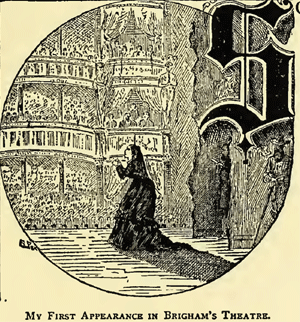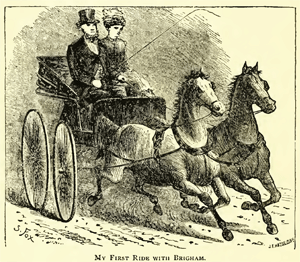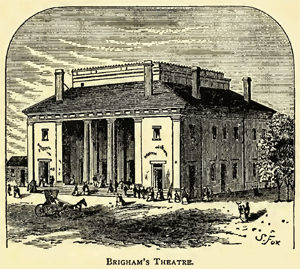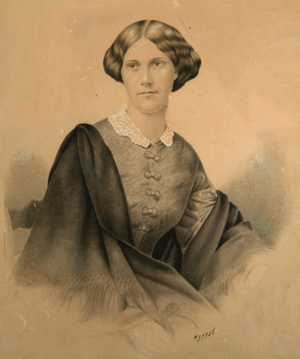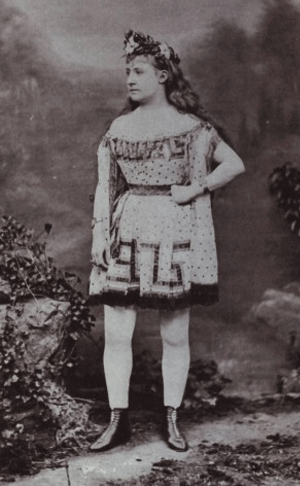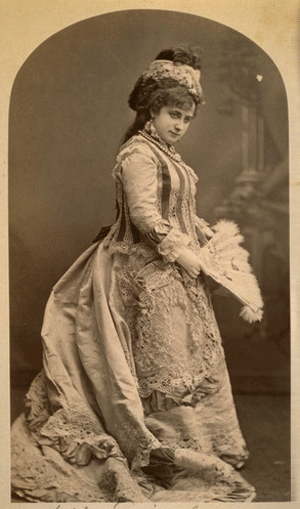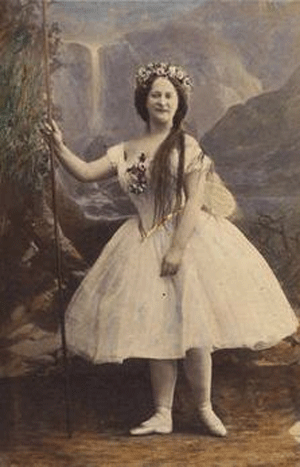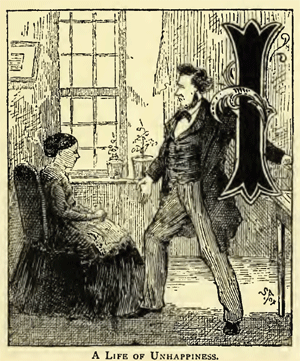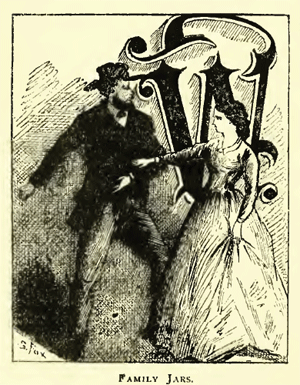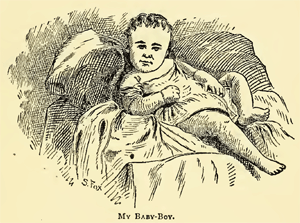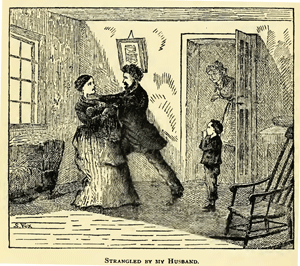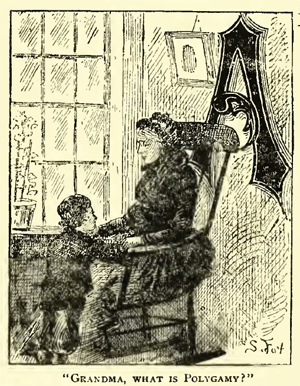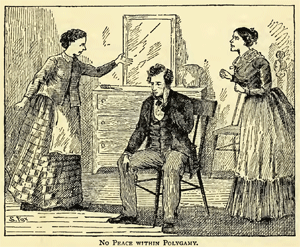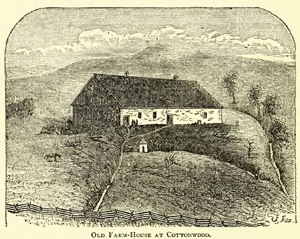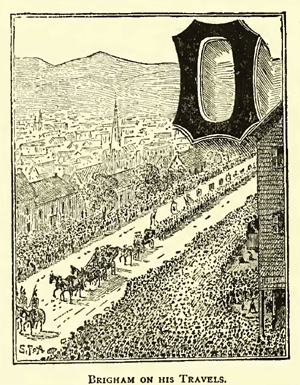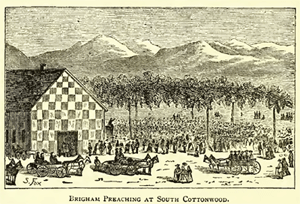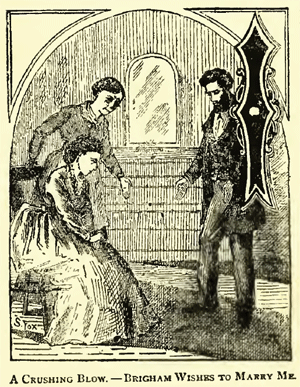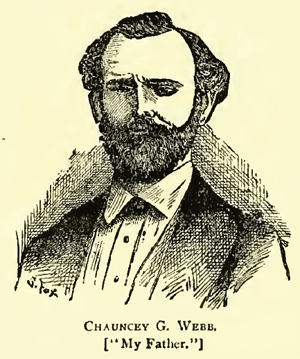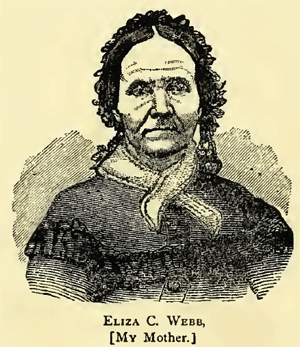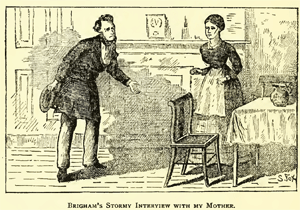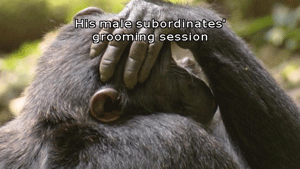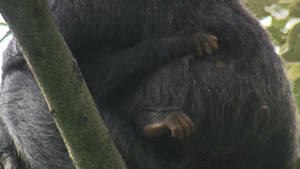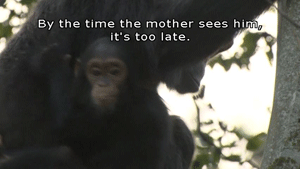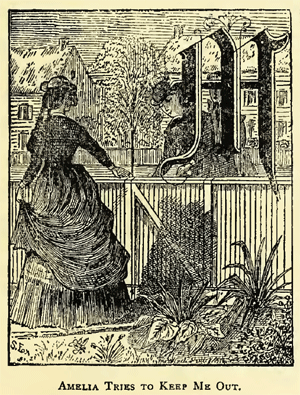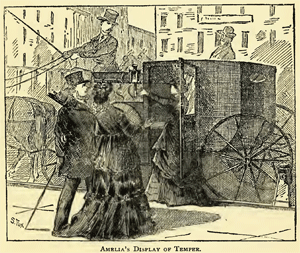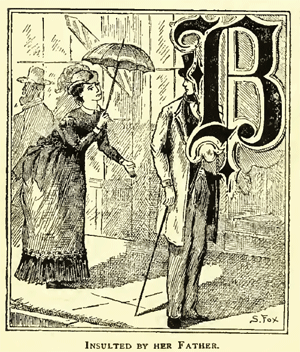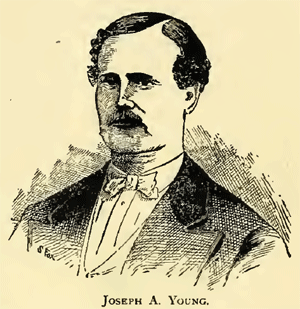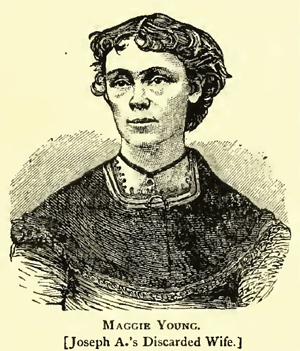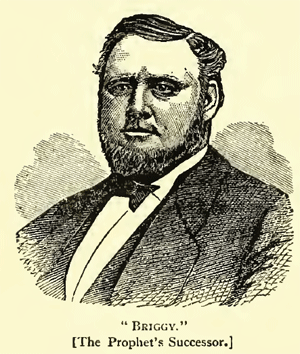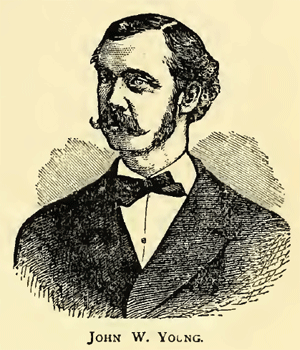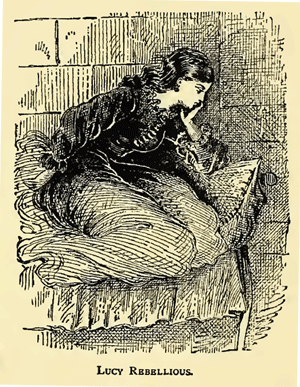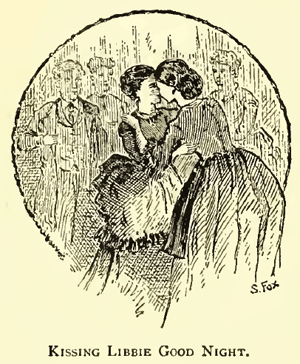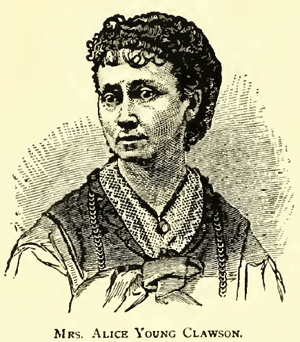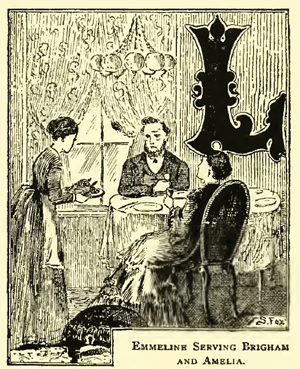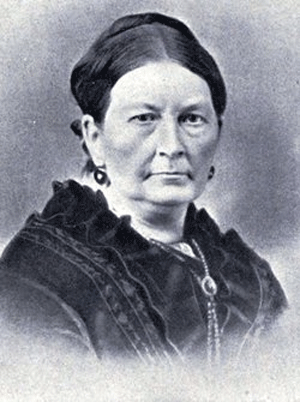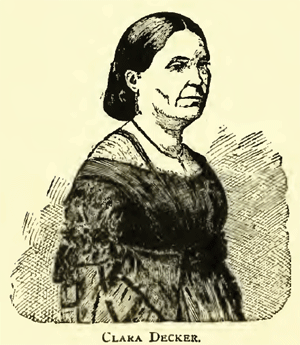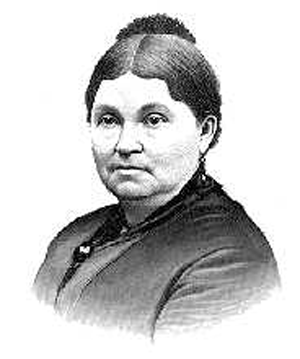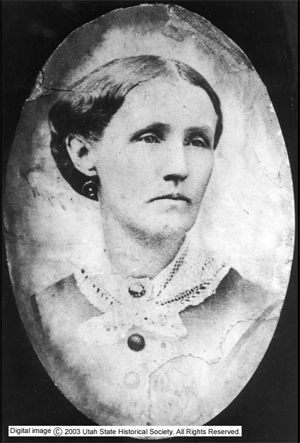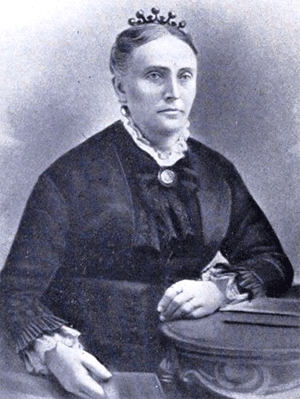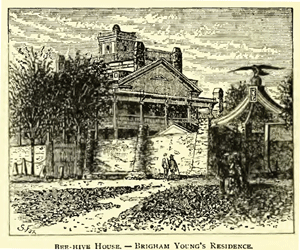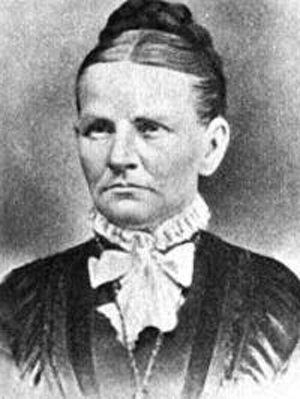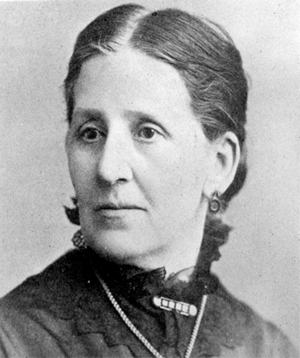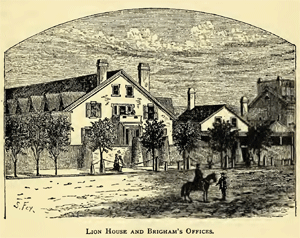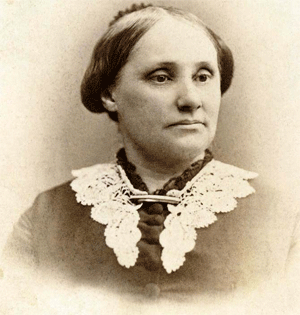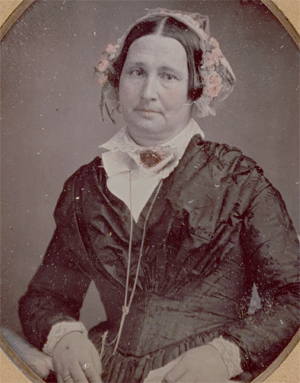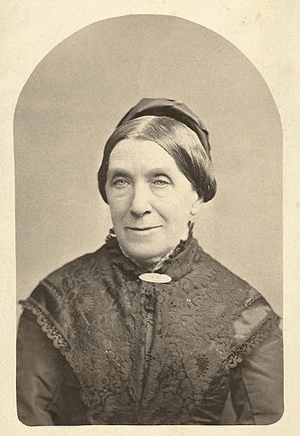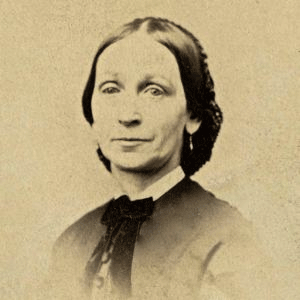In the Endowment-House. How the "Kings and Priests"appeared in their Shirts. The Poor Fellows "feel Bad!" The "Gods" hold a Conversazione. Michael is sent down to Earth. The "Tree of Life." How Raisins grew instead of Apples. Not good to be Alone. The Rib abstracted and little Eve made. The Devil dressed in "Tights." John D. Lee once a Devil. Eve's Flirtation. She eats Forbidden Fruit. Tempts her Husband. Fig-leaves come into Fashion. We hide in Holes and Corners. The Devil is Cursed and we are Lectured. The Second Degree. Story of a Pugnacious Woman. The Terrible Oaths of the Endowment-House. Pains and Penalties. Signs and Grips. "Good-bye!" Brother Heber gives me Advice.
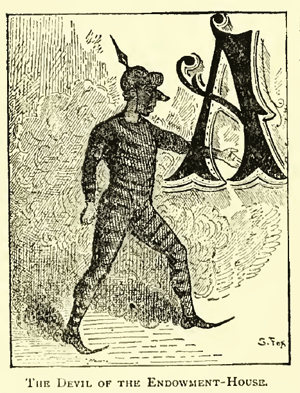
The Devil of the Endowment-House.
AFTER our names had been given us, Miss Snow announced that we were ready, in answer to a question from the other side of the curtain. We were arranged in a row facing it, when it was suddenly withdrawn, and we were standing face to face with the men. The sight that met our eyes was very funny, and I had all I could do to keep my features decently straight. I looked out from under my eyelids, for I did not dare give a good, square, honest look; it would have been altogether too much for my gravity; but from my stolen looks I found that the men, over their new garment of protection, wore a shirt only. On their feet were white socks and white linen shoes. The cap was of white linen, in shape exactly like those worn by stonemasons, and tied by a knot in front. They were certainly no more beautiful in appearance than we women, and, as is generally the case in embarrassing circumstances, were much less at their ease.
We were all conducted into another room, where we were seated opposite each other. We remained quiet for a few moments, getting used to the situation and our clothes, I suppose. Suddenly the silence was broken by voices in conversation. The persons who were carrying it on were concealed; but by listening intently we discovered that it was Elohim in conversation with Jehovah, and he was describing the creation of the world. His description was taken mainly from the first chapter of Genesis. The Gods then decide to visit the earth and see the works of their hands. This they do, and seem quite satisfied with the results of their labors; but they decide that it is necessary to place a ruler over the brute creation, since they must be governed and brought under the control of a superior order of intelligence.
The Gods continue their discussions, and Michael the Archangel is called and given control of "the earth and all that therein is." The brute creation is to be subject to him; the fruits of the earth shall yield abundantly for his sustenance. Of all these he is free to partake, with one single exception: he shall not eat of the fruit of a tree which stands in the middle of the garden.
This tree is represented by a small evergreen, on the branches of which are tied apples, raisins, oranges, or bunches of grapes, as may happen. The fruit on the occasion of my passing through was raisins.
Michael -- or Adam, as he is now called -- finds his new abode rather a lonesome place, in spite of its beauty; and even the knowledge of his power over all about him does not prevent him from longing for companionship. The Gods, too, decide that it is not good for him to be alone; and as there is nothing on earth that is sufficiently near an equality with him to be admitted to an intimate friendship, it is determined to give him a companion created specially for him. A profound slumber falls upon him, and we were all told at that time to feign sleep also, which we did. Elohim and Jehovah then make their first visible appearance, and go through the form of taking a rib from Adam's side, and on the instant appears Eve, in the person of Miss Eliza R. Snow.
At this point we were told to wake up, and instantly every Adam present appropriated to himself an Eve, and, led by the chief Adam and his bride, we all marched about, looking at our new kingdom and marking all its beauties. It was then that Adam became separated from Eve, and wandered off by himself, very much after the fashion of husbands of the present day; and while he was away, Satan entered and commenced a desperate flirtation with the coy and guileless Eve. The Garden of Eden is represented by painted scenery and furnishings.
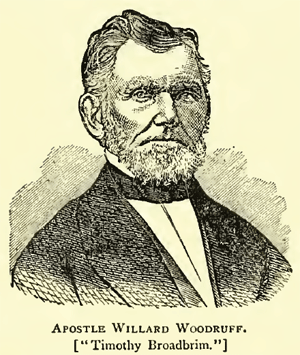
Apostle Willard Woodruff. ["Timothy Broadbrim."]
It requires some imagination to invest this place with all the beauty that is supposed to have belonged to the original garden; but as it is the best Eden that can be provided, we, like all the rest of the Saints, were obliged to be content with it. Satan was for many years represented by W. W. Phelps, who has recently died. Much to his own surprise and great chagrin, he saw his end approaching; for he had always claimed to be immortal, and on a seal-ring which he wore while in the Endowment-House was inscribed the blasphemous legend,
"The Lord and I
Shall never die."
I do not know who has succeeded him; but I know that in the Temple at Nauvoo, John D. Lee used frequently to assume the character, and I have heard old Mormons say that "he made a first-rate devil." I think no one who has watched his career will doubt that. Since, however, Brigham has recently cut him off from the church, it is hardly probable that he will ever again be able to make his appearance in his old character at the Endowment-House.
Satan was dressed in a tight-fitting suit of black, slashed with pink, pointed shoes, helmet, and a hideous mask. His costume, with the exception of the mask, resembled very closely the dress always worn by the stage Mephistopheles. I think he must have had different costumes, since it has been described several times, and the descriptions have varied in every case.
Eve seemed decidedly pleased with his attentions, and prattled on to him in artless gaiety. He, in turn, showed her the tree of the forbidden fruit, and tempted her to taste it. She did taste it, and finding it pleasant, offered it to Adam, who, by the time the mischief was done, returned to look after his wife. It required but little coaxing on her part to induce him to take the fruit, and he also found it agreeable. At this juncture they seemed to discover their condition of supposed nudity, and instantly they produced white linen aprons, with fig-leaves stitched upon them, and proceeded to put them on. All the rest of us did the same.
The pattern of this apron; by the way, was said to have been given to Joseph Smith by revelation. It was a square of white linen, measuring about eighteen inches, on which were to be sewn nine fig-leaves cut from green silk. Those who first took their Endowments had their aprons made after this model; but there were afterwards many inventions sought out for improving the Lord's pattern, one of which was to paint them. Over these painted aprons fancy fairly ran riot. The borders would be whatever color the person making them might choose, and were red, yellow, or blue, as the caprice dictated, with white centres filled with green leaves. The shape of these leaves was as varied as the people who wore the aprons. Some resembled the oak leaf, some the fig, a part the burdock, and others were like nothing else that ever was seen under the sun. A company going through their Endowments thirty years since, presented, it is said, a decidedly fantastic appearance. After trying every conceivable mode of making the aprons, they have settled down to the "revealed pattern" as the best every way.
After the aprons were on, the voice of Elohim was heard calling Adam; but he was afraid, and hid himself with Eve. All the rest of us were supposed to follow their example, and there was a most undignified scurrying behind sofas, chairs, or any other article of furniture that was convenient. It was like nothing so much as the old game of "hide-and-seek," and it was a rare piece of fun to see men and women scudding in every direction about the room. It was like a good old-fashioned frolic to me, and I actually laughed aloud, much to my discomfiture and Heber Kimball's horror, who reproved me afterwards, and told me it was very wrong. "For," said he, "these things are sacred, and make me feel as solemn as the grave, and I can scarce refrain from shedding tears every time I see them."
I was properly penitent, but I know I thought at the time how very easily Brother Heber was moved.
The devil was then cursed, and he fell upon his hands and knees, and wriggled and hissed in as snake-like a manner as possible; we were all brought out from our several hiding-places, the curse was pronounced upon us, which doomed us to leave the beautiful garden, and earn our bread by the sweat of our brows. We were then driven into another room, which was called the world; and then we had taken our "First Degree."
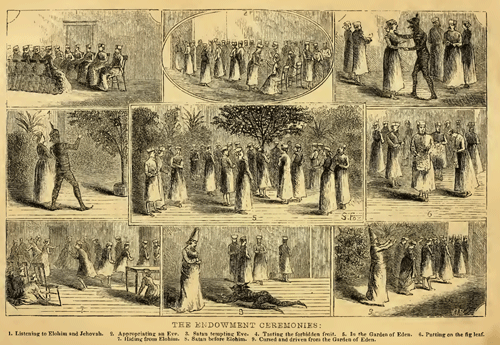
THE ENDOWMENT CEREMONIES
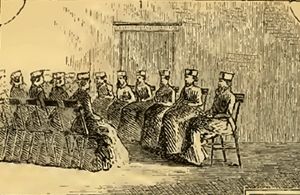
1. Listening to Elohim and Jehovah.
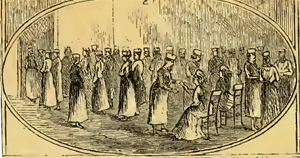
2. Appropriating an Eve
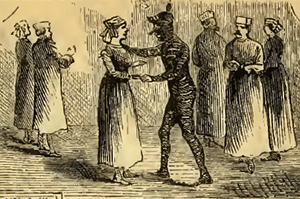
3. Satan tempting Eve.
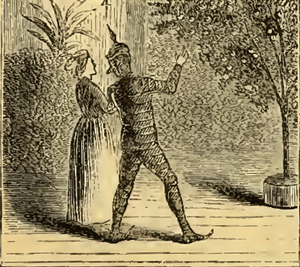
4. Tasting the forbidden fruit.
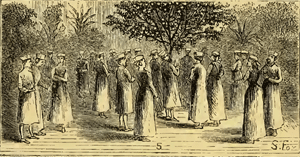
5. In the Garden of Eden.
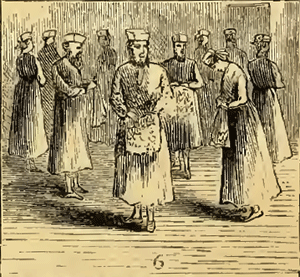
6. Putting on the fig leaf.
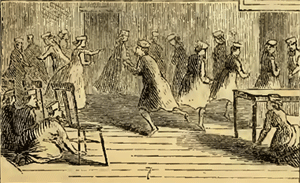
7. Hiding from Elohim.
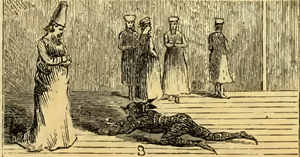
8. Satan before Elohim.
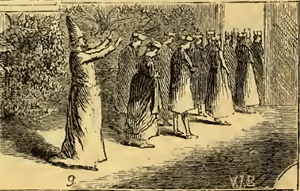
9. Cursed and driven from the Garden of Eden.
We found the world a very bewildering place. We were drawn hither and thither, and tossed about by every conflicting wave of circumstance. Our friend, the devil, did not leave, but was our constant visitor, urging us to new deeds of sin. We were waited upon by representatives of the different sects, each descanting upon his peculiar plan of salvation, and its advantage over all the rest. The Quaker advocated his non-resistance doctrine. The Methodist gave a graphic, but not very refined description of the future torments of those who did not take his road to heaven. The Presbyterian gave his belief in foreordination and election in the very terse lines,
"You can if you can't;
If you will you won't;
You'll be damned if you do;
You'll be damned if you don't."
The Baptist expatiated upon the virtues of immersion and close communion, and insisted upon predestination as the principal basis of religion; the Catholic called for observances of fasts and prayers to the Virgin Mary. Each grew more clamorous in recommending his special creed, and the discussion waxed fast and furious, even the peaceful Quaker shouting his "good will to men" with a red face, an angry voice, and excited manner, when Satan entered, filled with delight at the disturbance, and urging them on to renewed contention.
Then the apostles began to visit the earth, and comfort its afflicted tenants with plans of the true, revealed religion that was to be their salvation. They put the devil to flight, and the representatives of the "false religions" cowered and shrank away before the truth which they brought.
We were then given certain signs, pass-words, and grips, arranged in a circle, and told to kneel; the women were also required to cover their faces with their veils; then we were bidden to raise our right hands heavenward, and take the oath of implicit obedience and inviolable secrecy. The women promised entire subjection to their husbands' will; the men that they would take no woman as a wife without the express permission of the priesthood. We all promised that we would never question the commands of our authorities in the church, but would grant them instant obedience; we swore also to entertain an everlasting enmity to the United States government, and to disregard its laws so far as possible; we swore that we would use every exertion to avenge the death of our Prophet Joseph Smith and his brother Hyrum upon the Gentile race, by whose means they were brought to their unhappy fate, and to teach our children to foster this spirit of revenge also; and last of all, we swore never to reveal the mysteries of the Endowment House.
The breaking of this latter oath was to be followed by the most horrible penalties; torture of the most excruciating kind was to be inflicted upon anyone who should disregard this oath — his bowels should be torn from him while he was yet alive; his throat should then be cut from ear to ear; his heart and his tongue cut out; and in the world to come he should inherit eternal damnation. There should be, nor could be, no chance of salvation for him.
These promised penalties are by no means mere forms of words, given merely to add impressiveness to the ceremony. The "Blood-Atonement" shows that they are carried out, and hundreds of cases could be cited in addition to those already given, to prove that the Endowment-House penalties are by no means dead letters in the Mormon Church law. The cutting of every Gentile and apostate throat, and the "sending to hell across lots," that have been so openly and emphatically urged from the stand by Brigham Young and others, is only a public expression of the mysteries of the Endowment oaths.
Brother Heber endeavored to add weight and emphasis to this horrible rite by delivering a discourse to us on the duty of keeping quiet, even to our husbands or wives, on the subject; from the time we left the room we were in, the transactions therein must not be mentioned, or even hinted at, to anyone. He then entered upon a dissertation of the glories of the Celestial Kingdom, and fairly outdid himself in coarseness and vulgarity. It was then announced to us that the talk finished the ceremony of the "Second Degree," and we were told to enter the next room, for the purpose of having the "Third Degree" of the Order of Melchisedec Priesthood conferred upon us.
In this room a portion of the scenes of the last were repeated: the devil encouraged the ministers of the conflicting denominations to visit the new inhabitants of earth, and urge their religions on them once more. The apostles stop the proposed visit, and explain still further the doctrines of the true faith; they organize a new church, which is, of course, the "Church of Jesus Christ of the Latter-Day Saints." Our Temple robes were changed; resting afterwards upon the left shoulder and fastening under the right arm which was a sign that we were now received into the true church, and subject to the will of its leaders. Another grip was taught to us, and we then received the "Third Degree," and were ready to "pass through the veil."
The men, of course, went through first, and they were permitted then to take us women through.
The room we were in was divided by a muslin partition, in which was a door; in this door was a hole just large enough to pass the hand through, and over this hole was a curtain of muslin. The persons who were behind this muslin partition -- which was supposed to represent "the veil" -- were invisible to us, although they could see us distinctly.
A man approached the door as if seeking admittance, and the Apostle Peter, appearing at the opening, asked who was there and what was wanted. He was told that some one wished to enter. The applicant was told to come near, and, as he approached, hands came through the opening in the door, and cut a mysterious mark on each breast of the man's garment, another over the abdomen, still another over the right knee. The garments of all the applicants were treated in the same mysterious manner, and the women were told to copy them in their own when they went home. It was also commanded them that whenever other garments were made, these marks must be placed on them.
After the garments had been cut, the applicant for admission gave the last grip which had been taught them, through the slit in the partition, and whispered his or her new name to those behind who were waiting to hear it, and was then permitted to go "behind the veil." The women were then taken through, the married ones by their husbands; I, as I have before said, by Elder Samuel Richards, brother of Apostle Franklin D. Richards, of Hand-Cart memory. Several remained to be sealed, but as I had not that ceremony to go through, I was permitted to go away.
I was perfectly exhausted by what I had passed through, and quite dissatisfied. It was so different from what I expected that I was saddened and disappointed by it all. My feelings of the morning had undergone a most radical change. I was no longer buoyed up by the enthusiasm of religious fervor; that had died away, and I was as hopeless and apathetic as I had before been eager and buoyant.
I was too tired to go home at once; so I went to Heber Kimball's to rest. When he returned from the Endowment-House he found me there, and he asked how I felt since I left the House; if I had found peace and help. I told him no; that I felt worse, if possible, than ever. It was then that he reproved me for the levity which he had seen me show, and told me he feared I did not take my Endowments in the right spirit. I began to think that that might be the case, and that the fault lay with me and my understanding, and possibly the ordinance was not such a farcical proceeding as it had seemed to me; and I took the reproof so humbly and with such good grace, that Brother Heber grew absolutely hopeful for me.
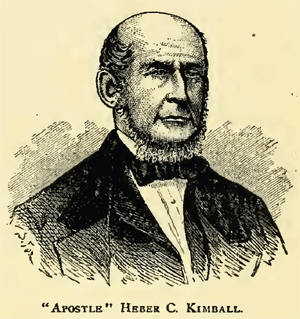
"Apostle" Heber C. Kimball.
It is claimed that the mysterious rites were taken from Masonry, and that the Endowments are a direct outgrowth of the secret society. Brigham Young delights, I know, to speak of it as "Celestial Masonry," but I am very sure all good Masons would repudiate it and its teachings.
In regard to the oaths of secrecy which I took at that time, I do not consider that I am doing anything wrong in breaking them; I am sure I shall in no way be held accountable for so doing. I took them because I felt that I must. I did not know what I was promising until after the oath was given me, while I listened with uplifted hand. I was bound to secrecy, but I feel that right and justice demand that I shall break these bonds. I consider it a duty to expose, as far as I possibly can, the wickedness, cruelty, blasphemy, and disloyalty of the leaders of the deluded Mormon people.
All Mormons who have received their Endowments are buried in their robes -- caps, shoes, apron, and all. It is held necessary in order to insure their entrance into the Celestial Kingdom. One of the authorities in the church was once asked what would become of the Mormon children who should die before they were old enough to receive their Endowments, and consequently were buried without the robes.
He replied that their parents, or whoever had the power of resurrecting them, must prepare the clothing, and when their dead came out of their graves they were to clothe them with the sacred robes.
A few years since a man named Baptiste was discovered robbing the dead of their garments, and as a matter of course the greatest excitement prevailed. He was immediately "made away with," his house searched, and a large number of robes discovered. Some said that he was put on a little island in the lake, and left to perish. Others said that Porter Rockwell looked after his interests. But certain it is that he "disappeared," and was never seen again. The garments were identified, and the friends of the dead began taking up the bodies and replacing the robes. Brigham ordered them to desist, telling them that "under the circumstances their friends would be taken care of in the resurrection;" so most of the robes were never restored.

